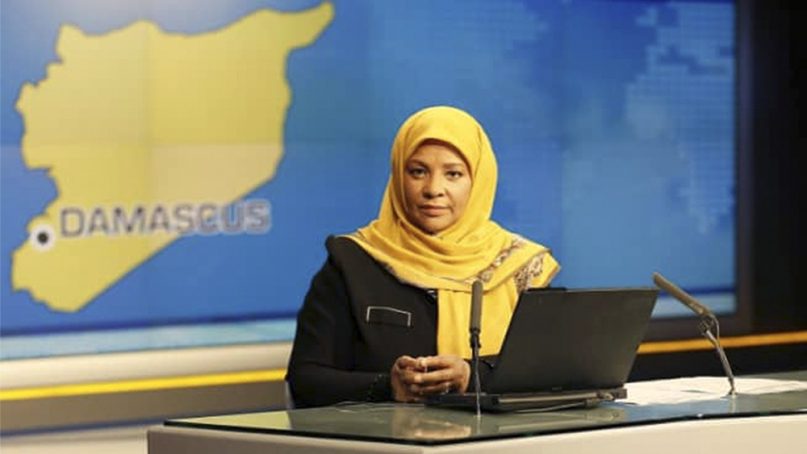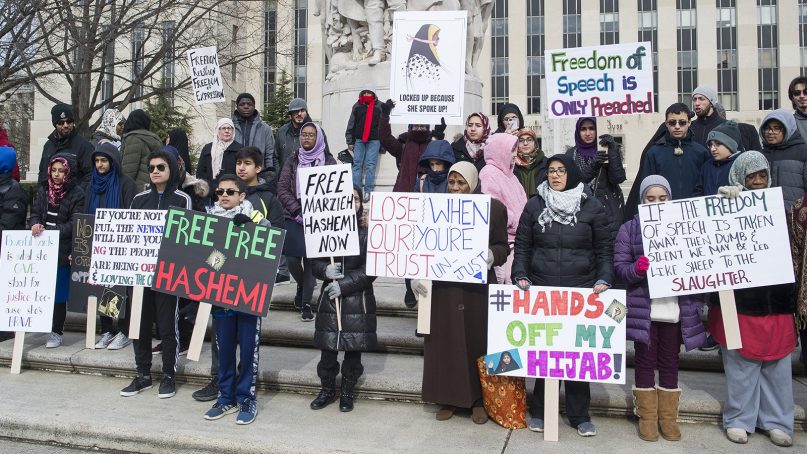(RNS) — Muslim civil rights organizations have joined press freedom and other human rights groups in questioning the FBI’s detention of an American-born journalist based in Iran.
Marzieh Hashemi, a U.S. citizen who works as an anchor for Iran’s state-run English-language Press TV, was detained on Jan. 13 at St. Louis Lambert International Airport, according to federal court documents made public on Friday (Jan. 18). Hashemi had been in the U.S. filming a documentary on Black Lives Matter and visiting some relatives.
Hashemi has not accused been accused of a crime. According to court documents, she was taken to Washington, D.C., and is being held as a material witness until her grand jury testimony for an unspecified case is done.
“We join her family and others in asking that Marzieh Hashemi be released immediately,” Darakshan Raja, co-director of the D.C. Justice for Muslims Collective, told Religion News Service. “She has been detained under material witness laws, which have been used post-9/11 to detain Muslims without being charged for a crime, and represent a clear form of due process and civil rights violations.”

This undated photo provided by Iranian state television’s English-language service, Press TV, shows American-born news anchor Marzieh Hashemi at its studio in Tehran, Iran. (Press TV via AP)
Federal law does permit the government to compel testimony in certain circumstances by arresting and detaining witnesses. The government must be able to prove that the testimony is considered “material” to a criminal proceeding and that the witness will likely flee if subpoenaed.
Civil rights watchdogs have noted, however, that the U.S. has misused material witness warrants in the past to evade the requirement of probable cause of criminal conduct, particularly in cases related to Muslims.
Since Sept. 11, the Department of Justice has “deliberately used the law … to secure the indefinite incarceration of those it has wanted to investigate as possible terrorist suspects” and has left the law “twisted beyond recognition,” according to a 2005 report from Human Rights Watch. Last year, a federal appeals court ruled that misusing material witness warrants is unconstitutional.
Hashemi’s family has also said that she is being denied the right to wear her hijab and is being denied pork-free meals, in violation of her religious rights.
“Law enforcement officials must clarify why they are holding Ms. Hashemi without formal charges and why they have allegedly denied her religious rights while in custody,” Nihad Awad, national executive director of the Council on American-Islamic Relations, said in a statement. “There can be no justification for denying an American citizen, or any other person, their basic civil and religious rights.”
Born in New Orleans as Melanie Franklin, Hashemi changed her name after converting to Islam. The Iranian government, which also considers her a citizen of Iran due to her marriage to an Iranian man, has called for Hashemi’s “unconditional” release.
Prominent press freedom groups have also denounced the detention.
“The US judicial authorities must announce the charges they plan to bring against this journalist,” said Reza Moini, who heads the Iran desk at Reporters Without Borders. “The opaqueness surrounding her detention is unacceptable. Marzieh Hashemi’s fundamental rights must be guaranteed.”
“We are concerned by the arrest of a journalist for Iranian state TV, Marzieh Hashemi, and call on the U.S. Department of Justice to immediately disclose the basis for her detention for the past five days,” said Alexandra Ellerbeck, North America program coordinator for the Committee to Protect Journalists.
The Department of Justice did not respond to a request for comment.





